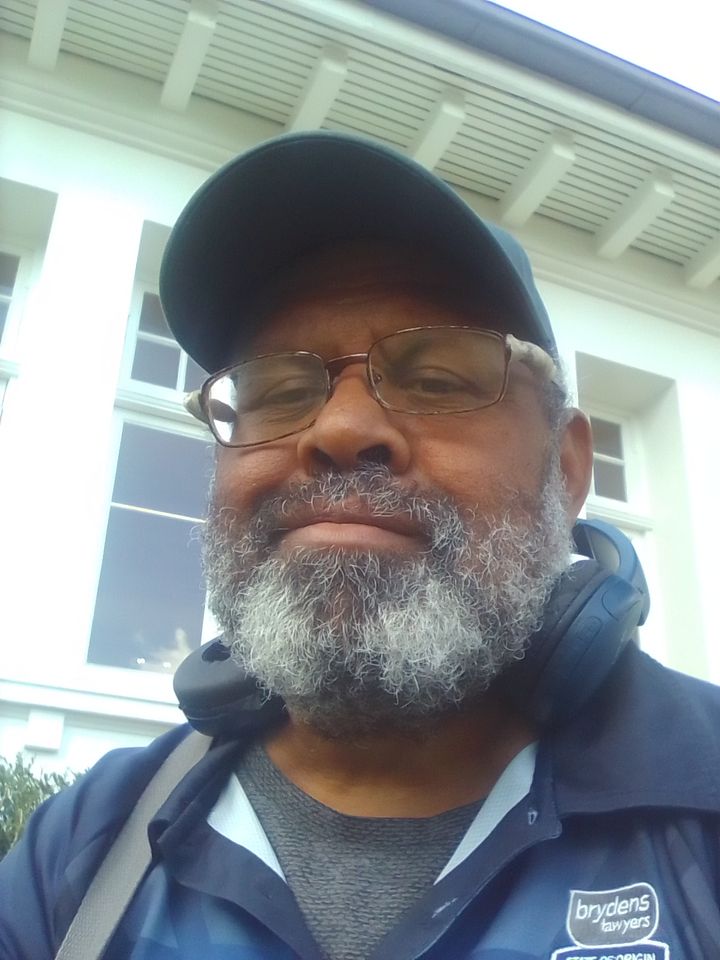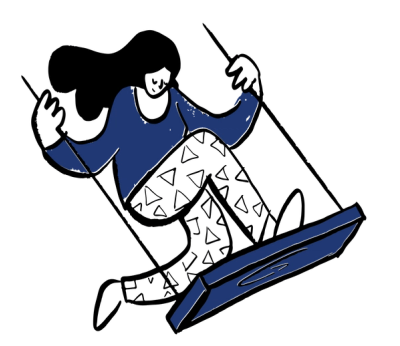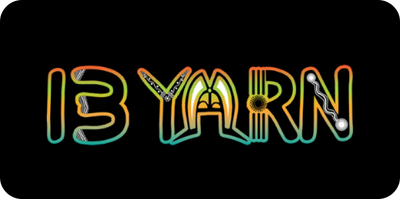Monwell's story
In this episode, we're honoured to have Uncle Monwell, an Aboriginal and Torres Strait Islander man. His inspirational journey from personal hardships to talented musician embodies courage, hope, and a passion for change.
Uncle Monwell faced adversity, dealing with ADHD, PTSD, and self-harm in his early years. Growing up in a domestic violence environment, he learned the value of resilience and compassion.
Despite experiencing homelessness and struggles with substance abuse, gambling, and suicidal thoughts, Monwell's determination led him towards recovery and self-discovery.
Listen here
Read transcript
Note: this transcript has been edited for clarity, grammar, and flow.
Darcy: Lifeline Australia acknowledges the traditional Aboriginal and Torres Strait Islander custodians of the land on which we are based, the Gadigal people of the Eora nation, and all the lands across which our national network spans. We pay deep respect to Elders, past, present, and emerging.
We acknowledge the lives lost to suicide and recognise those who have survived suicide attempts and those who struggle today or have struggled in the past with thoughts of suicide, mental health challenges, and crisis situations. We also acknowledge all those who have felt the deep impact of suicide, including those who love, care for, and support people experiencing suicidality, and those who have experienced pain and bereavement through suicide.
We respect collaboration with people who have a lived or living experience of suicide and mental health challenges and value their contribution to the work we do.
Monwell: Being resilient, having that never-give-up attitude, learning from your mistakes, understanding them, and moving on - these are the positive things you need in life.
Darcy: Welcome to Holding on to Hope, the series that shares the stories of everyday Australians who have experienced moments of crisis and found a path to support. Whilst all the stories shared offer hope and inspiration, at times you may hear something you find triggering. If you or someone you know needs crisis support, please phone Lifeline on 13 11 14, text 0477 13 11 14, or visit lifeline.org.au to access the Lifeline chat service, available 24/7.
Ruben: Hello, and thank you for joining me. I'm Ruben, a volunteer telephone crisis supporter at Lifeline and one of the voices you may hear when you call for support.
At the age of 15, I lost my father to suicide. Ever since that day, I’ve wished he had the opportunity to talk to someone like me when he needed it most. Thirteen years later, and four years into my journey with Lifeline, I’m now part of that opportunity. This is why I’m so passionate about hosting this series. If you’re not quite ready to talk, perhaps you’ll find comfort by listening to the stories of people who have experienced the value of reaching out for help.
Today, we are honoured to have Uncle Monwell with us. An Aboriginal and Torres Strait Islander man, he has faced personal hardships and risen to become a talented musician. Uncle Monwell’s journey is truly inspirational.
He has stared adversity in the face, battling ADHD, PTSD, and self-harm during his formative years. Growing up in a household with domestic violence, he learned firsthand the importance of resilience and compassion. Monwell experienced homelessness, struggled with substance abuse, gambling, and suicidal ideation. Yet through sheer determination and a will to heal, he forged a path towards recovery and self-discovery.
Now, he devotes himself to supporting others, contributing to the National Indigenous Cadetship Programme and working in disability support.
Hi, Monwell. Thank you so much for joining me on the Holding on to Hope podcast. You are a proud Torres Strait Islander man. Please explain your ancestral ties and a bit about the country you grew up in.
Monwell: Firstly, I was born in Townsville, on Bindal country. My parents come from the Torres Straits. My blood ties are with Mabuiag, Gebar, and Tudu - those are the main islands my family is connected to. These islands are part of the western and central Torres Strait.
Ruben: I’d like to invite you to share whatever you feel comfortable with about your upbringing.
Monwell: I was born in Townsville. My dad was a railway worker, and my mum was a housewife. We had seven kids, and I was the third youngest. It was a small house, but they were exciting times.
As a kid, we used to play cricket on the road, rugby in the yard, and explore guppies and tadpoles when it rained. It was a good time.
Ruben: Throughout your journey, you’ve struggled with ADHD, PTSD, and self-harm. What kinds of thoughts and feelings did you experience during that time?
Monwell: With ADHD, as a child, I was misunderstood. Back then, parents didn’t really understand it, and society didn’t either. It wasn’t recognised like it is now.
It was hard to stay focused. I was caned from Grade 6 to Grade 12. It was tough.
Ruben: How did that make you feel?
Monwell: Helpless. I became the class clown because I didn’t know what else to do. I wanted to make school fun. I was good at sports, but when I got the cane at school, I’d get it again at home from my dad.
Looking back as an adult, I’ve researched ADHD and understood how it affected me. Some of the symptoms really describe me. When I finally understood it, I felt more at peace with myself. I started noticing how I’d react to things and learned to calm myself when I felt angry.
Ruben: Are you able to share what you struggled with when it came to PTSD and self-harm?
Monwell: PTSD has been with me for a long time. When my father would beat and discipline me, it was really tough. As soon as he left the room, I’d punch myself in the head. I’d walk to school, feeling the lumps on my head. I remember standing in front of the mirror, looking at myself.
I’ve carried that PTSD throughout my life, and for years, I tried to suppress it with alcohol.
I also worked as a carer for a young Aboriginal boy who was non-verbal. I looked after him for nearly two years, and I did my best for him. When it was time for him to leave us, I wheeled him out of the room, and even though he couldn’t speak, he had tears running down his cheeks.
Two days later, he passed away. That moment stayed with me, and it brought back a lot of my PTSD. It’s a real thing, and it can catch up with you when you least expect it.
Ruben: Growing up in an environment of domestic violence, how did this affect you and your relationships with others?
Monwell: Mum copped a lot. Back in the ‘70s and ‘80s, it was like domestic violence was just something that happened everywhere.
Dad would come home from working on the railways, sometimes drunk, and he’d take it out on Mum. Hearing her cry as an eight-, nine-, or ten-year-old was terrifying. It brought fear into the house—everyone was just scared.
I tried running away a few times. My brothers ran away too. I often ended up staying with my auntie and uncle because their house felt like a safe place for us.
Ruben: Your journey includes experiences of homelessness, substance abuse, gambling, and suicidal ideation. What pivotal moments or realisations motivated you to start your path towards recovery?
Monwell: Homelessness was a big challenge. I stayed with my brothers and even crashed on a mate’s couch, which was too small for me. Eventually, I ended up at Centennial Lodge, run by the Salvation Army, and spent time with organisations like Ozcare and Mission Australia.
At that point, I didn’t care about myself. I was lost. Being around others in similar situations forced me to reflect on my life. I started asking myself why I was the way I was.
Gambling was a big part of it. I started gambling when I was young, playing poker machines for 20 years. That was why I became homeless—I gambled all my money away.
One of the counsellors at Ozcare, from UnitingCare, helped me start turning my life around. She gave me tools to understand myself and my behaviours. That was the beginning of my recovery.
Ruben: Are you able to share a bit about your experience with suicide?
Monwell: When I gambled and ran out of money, the lows would hit hard. I remember once, I was so broke I had to put five-cent coins into a Coles checkout machine just to buy a pack of noodles for 75 cents.
I lived on the third floor of a building, and every time I walked up the stairs, I’d look down and think about jumping. It became a fortnightly routine because that’s when I’d hit rock bottom after losing everything.
There were times when I’d close the blinds and sit in a dark room for hours, punishing myself emotionally and mentally. I’d stand in front of the mirror, putting myself down and calling myself names.
Ruben: What was the first step in getting help for the issues you were struggling with?
Monwell: Seeing a counsellor was my first real step. They gave me tools to manage my thoughts. One of the tools was linking a happy memory to a depressive one.
For me, it was a song - Africa by Toto. That song reminded me of being a kid, and every time I heard it, it brought me back to that happy place.
The counsellor also explained how gambling and drinking create highs and lows. Payday is the high, and the crash comes after. Understanding that cycle helped me stop. Once I got out of those ups and downs, life felt smoother—like an awakening.
It wasn’t about just surviving anymore; it was about truly living.
Darcy: We hope you’re enjoying this episode. Lifeline’s new Support Toolkit makes it easier to care for family, friends, and loved ones while looking after yourself along the way. Visit us at toolkit.lifeline.org.au. Now, back to the episode.
Ruben: What self-care practices have been beneficial for you, and how have they impacted your overall wellbeing?
Monwell: I need to go back to my father’s deathbed in 1997. He asked for my forgiveness, and I said I forgave him. But the truth is, it took me years to fully forgive him.
Last year, I finally found peace with it. I forgave him completely because I started to understand his life—what he must have gone through as a child. We’re only a few generations removed from slavery. My family has a history of blackbirding and the selling of children. Understanding that context helped me let go of the anger I carried.
Forgiving him healed me. It felt like a weight was lifted off my chest. That forgiveness allowed me to start loving myself.
Now, mindfulness is a big part of my life. Being present and aware of where I am helps me quiet the noise in my head. When I let go of the weight of the past, everything feels clearer.
Ruben: How do you maintain hope during difficult times and inspire hope in others?
Monwell: I’ve learned to let go of memories that don’t serve me. Negative memories are like clutter. They take up space and bring strong emotions like anger or hate.
I treat my mind like a room. I clear out the things I don’t need, the things that weigh me down. It’s a form of mindfulness, and it’s something that’s helped me a lot.
Being resilient is about having that never-give-up attitude. You learn from your mistakes, understand why they happened, and move forward with positivity in your life.
Ruben: You dedicate so much of your time to supporting others and paving the way for those in need. Can you tell us about the work you’re doing in the Aboriginal and Torres Strait Islander community and your involvement in anti-gambling organisations?
Monwell: Through my gambling counsellor, I was invited to a community talk in Cairns. There, I met a group called Three Sides of the Coin, based in Melbourne. They’re a theatre company made up of people with lived experience of gambling.
I sang a song I wrote back in 2010 called Poker Machine Blues. They loved it and incorporated it into their work advocating against gambling.
When I returned home, I started noticing more people gambling on their phones. It’s the next level of gambling, and it’s everywhere in small communities. My vision now is to help others overcome their gambling addiction. I want to be part of the solution, sharing my story and helping people break free from that cycle.
Ruben: Becoming a carer for your mother on Moa Island shows your selflessness and nurturing spirit. How has this role impacted your life, and what have you learned from the experience?
Monwell: Caring for Mum feels like giving back for everything she did for us. Growing up, she was our rock during those tough times of domestic violence.
For two years, I cared for her full-time. Now, because she can’t shower herself, my sisters and nieces help with that part. But being there for her has taught me so much about empathy and care. It’s something that comes naturally in our family - we’ve always been strong and connected.
Ruben: How has music played a role in your healing process and in spreading your message of courage and hope to others?
Monwell: Music has always been my outlet. I’ve had a guitar since I was young, and songwriting became my way of expressing myself. My songs are like a journal of my life—they show where I’ve been, what I’ve done, and how I’ve felt.
Music is my constant. I don’t think I could live without a guitar.
Ruben: I’d like to invite you to share with the audience one of your powerful pieces of poetry or lyrics.
Monwell: There are two songs that stand out: One Day and Cruel Homelessness. I’ll share the second verse of One Day:
If the fight is willing, battle hard, seek for redemption Release the tension inflicted by your past, reignite the light in you Reach for that second wind that will carry you through Because we are all drops in the ocean. And together, we make waves So don’t give up on me, my friend. I’ll come good, I’ll come good, one day.
And here’s a verse from Cruel Homelessness:
Living out of a suitcase, staring at four walls Not sure what the future holds, I’m hanging on to her Gotta find the answers to why I’m meant to be Living in and out of consciousness is not surely helping me
Ruben: Thank you so much, Monwell. We truly appreciate you sharing your story and your lyrics with us.
Monwell: Thank you.
Darcy: Thanks for listening to Holding on to Hope. Lifeline is grateful to all participants for sharing their personal lived experiences so openly and courageously.
If this story has inspired you, remember that you don’t have to struggle alone. Visit toolkit.lifeline.org.au today.






